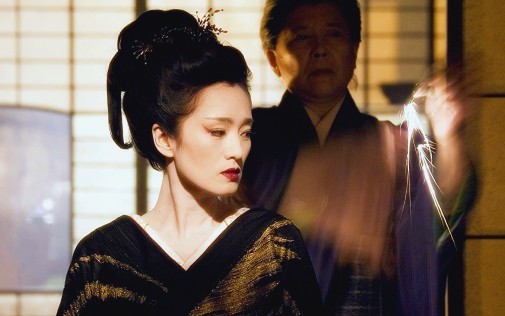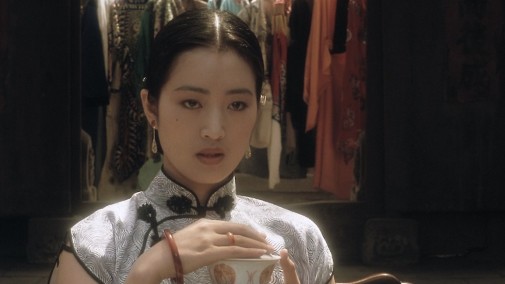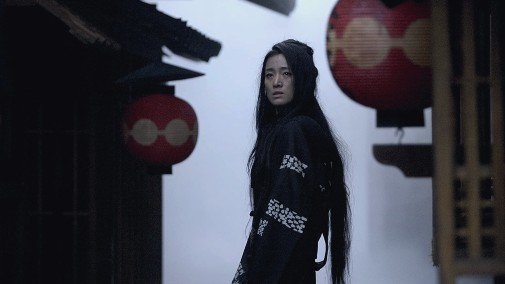
Earlier this month, Sean Donovan wrote a beautiful piece about Tilda Swinton's 2005 Hollywood adventure. The movies mentioned in that text mean a great deal to me since they represent the first time I ever came across the alien allure of that British thespian. Even as an eleven-year-old, I was hooked on this beguiling creature of the screen. Surprisingly enough, Swinton wasn't the only performer whose 2005 forays into mainstream American movies served as a gateway for my love of auteur cinema and über-glamourous deities of the big screen.
For that was also the year when Chinese superstar Gong Li blessed Rob Marshall's unfortunate Memoirs of a Geisha with her electrifying presence…

Born in Shenyang, Liaoning, and educated at the Beijing Central Academy of Drama, Gong Li was quick to find success in the movie business. While at school, she was spotted by Fifth Generation filmmaker Zhang Yimou and he cast her in what was to be his debut. 1987's Red Sorghum was both cineaste's first feature and first success, making the two of them into internationally respected artists. The Golden Bear-winning film is like a rural poem of cinema, a striking mural painted in shades of gold and blood, ravishing to behold and painful to feel. Their follow-up collaborations would be even greater, with Gong Li becoming a more seasoned performer with each film.

By the time of 1991's Raise the Red Lantern, she was a master of her craft, capable of singing an opera's worth of human tragedy with a single look or the aborted movement of her hand. For the actress' efforts in that merciless drama, she got a National Society of Film Critics Award, the first of many international accolades. The following year's social realist comedy The Story of Qiu Ju, for instance, got her two prizes at the Venice Film Festival among other honors. That being said, when it comes to the matter of Oscar gold, Gong Li's first realistic bid for a nod would come, not by the hand of Zhang Yimou, but through the cinema of another up-and-coming director.
Chen Kaige's historical epic Farewell, My Concubine is still the only Chinese film to conquer the Palme d'Or, and Gong Li's mercurial supporting turn got her a well-deserved New York Film Critics Circle Award. It's still her best performance, a mix of movie star intensity and psychological acuity whose effect cannot be overstated. She draws the audience in with intimidating glamour before breaking their heart, stepping on it, and then setting the remains on fire. Looking at Gong Li's filmography it's quite impressive how she managed to become such a commercial star while maintaining a high standard of artistic accomplishment. Easy popularity sometimes trumps the need to challenge oneself, but Gong Li has always been able to keep the balance.

Just look at her 1994 as an example, and see that dynamic at its most extreme. In the same year, she starred in the incoherent wire-fu extravaganza of The Maidens of Heavenly Mountain and breathed life into one of Zhang Yimou's most bruised and realistically underplayed dramas, To Live. The rest of the 90s were similarly spent, cementing an enviable filmography that dazzled both the public and the critics. It was during those wonderful years of endless success that Gong Li first tried her luck at English-speaking cinema, though her linguistic limitations forced her to learn the roles phonetically.

Sometimes, that approach works, like in 1997's autumnal Chinese Box. Sometimes, it results in stilted performances that rely mostly on the actress' natural magnetism – 2006's Miami Vice, for example. It was between those two forays into Anglophonic cinema, that I first became aware of the actress. As previously mentioned, Memoirs of a Geisha was the movie that introduced me to Gong Li. To this day, and despite the controversy of casting a Chinese actress as a Japanese character, it remains her best work from an English screenplay. In part, that's because Marshall makes such great use of the diva's qualities as an aesthetic phenomenon and raw screen presence.
Gong Li's confidence is overwhelming as is the air of slight threat that infects her every action as the callous Hatsumomo, an antagonistic geisha that plots against the story's heroine. Just seeing her slinking her way across a scene's background tells us all we need to know about the character. If Zhang Ziyi's Sayuri is water, then Gong Li's Hatsumomo is a volcanic eruption, exploding fire that threatens to burn everything to a crisp at the slightest provocation. How appropriate then, that the character exists the narrative on the advent of fire. As she walks away from her life leaving behind only ashes, we know this disaster was unavoidable. Even if Rob Marshall didn't foreshadow this end, Gong Li's fieriness did it with only the insolence of expression and pose.

Memoirs of a Geisha once again brought Gong Li to the Oscar conversation, just like Concubine had done. She got a National Board of Review prize for the star turn, though her bid lost steam as the awards season went on. Zhang Ziyi ended up winning most of the buzz for the movie, but even she failed to secure a nomination for the Academy Awards. Since then, Gong Li's worked less than before, though her career continues golden in her native China. In the past decade, she's even reunited with Zhang Yimou for 2014's Coming Home and also starred in 2019's Saturday Fiction, directed by Ye Lou. More recently, she played one of the apparent villains of the live-action remake of Mulan, which is coming to Disney+ on September 4th. Hopefully, the role will befit Gong Li's extraordinary talents so that other little cinephiles can discover the marvels of Chinese cinema through this goddess.

Are you a fan of this Chinese superstar? If so, what was the first movie you ever saw Gong Li in?